By Girija Madhavan
Looking back on my thirty-five years as an Indian Foreign Service (IFS) wife, memories come flooding back; some happy ones, some of wonder, some of stress and tension. Holding an Indian Diplomatic Passport, I was a member of the Embassy, the official hostess of my husband A. Madhavan. I ran the house, helped to make friends with local people, tried to project a good picture of India when we entertained. Life was often hard when faced with linguistic, domestic or medical problems in unfamiliar or unfriendly settings.
Life for the Women Foreign Service Officers of India, however, was hard in the initial years. Our Foreign Service was hierarchical and conservative in format. The rules were heavily weighted against women.
Chonira Belliappa Muthamma (C.B. Muthamma) was the first woman to pass the UPSC exam in 1949 and to opt for the Indian Foreign Service. Born in Virajpet, Kodagu, she was brought up by her mother after she lost her father at an early age. She did her post-graduate degree in English Literature in Madras (Chennai). She held steadfastly to her goal of being an Indian diplomat in spite of many deterrents. When she joined the service, she had to give an undertaking that if she should marry, she would resign. Though this rule was rescinded a couple of years later, it cost a couple of other female aspirants their careers. Ambassador Rukmini Menon was another successful woman diplomat after Muthamma.
Muthamma’s undeniable excellence made it impossible deny her a place in the Foreign Service. Yet for some years she was not sent on a foreign assignment. She was at last posted as Third Secretary to the Indian Embassy in Paris, and in later years as Ambassador to Hungary, Ghana and the Netherlands. Her struggle for gender equality has helped later Indian women diplomats.
In 1979, she went to the Supreme Court against the Government of India, citing gender discrimination. In a landmark judgement, Justice V.R. Krishna Iyer ruled in favour of Muthamma, and thereby also helped the many women who now have joined the IFS after her.
She never stood for unfairness and deceit. For a while we lived in a big gated colony in Delhi where she had an apartment. Tamil people, many from Salem, worked there. Once there were complaints of valuables missing. Krishnan and Gopalan, two Tamilians who had been framed for the thefts, were taken away to the Police Station. But though subjected to brutal interrogation, they did not break down and were released. Muthamma discovered the real culprits, Krishnan and Gopalan were exonerated and the guilty were sacked.
Muthamma had acquired a farm in Mehrauli near Delhi in the early years. When she retired, it was worth a very large sum of money if sold. But she chose to give it away to charity; very few people know of this generous gesture. Muthamma was fond of cooking and published a book “The Essential Kodava Cookbook” and also a book of essays titled “Slain by the System…” An admirer of hers remarked it would be more apt to say “Slayer of the System.”
After we retired and came to live in Mysuru, she visited us a couple of times with her brother en route to Bengaluru. Smiling and relaxed, she enjoyed the sweets made for her. We both respected and admired her courage and will power.
As a contrast, another woman diplomat, Vijaya Lakshmi Pandit (1900-1990) faced none of these travails. Originally named Swarup Kumari Nehru, eleven years younger than her brother, Pandit Jawaharlal Nehru, schooled in Switzerland, her background was one of aristocratic status and wealth. However, she was influenced by Mahatma Gandhi. She was politically active in local self governing bodies in India and later “entered” diplomacy when she was sent as Her Excellency, Indian Ambassador to the erstwhile Soviet Union (1947-1948). She was the first Asian woman to be President of the UN General Assembly in 1953. With beautifully coiffed hair, blouses with high collars and tasteful silk sarees, she was a figure of sophistication and elegance.
In 1954 she was appointed High Commissioner to London. She was acclaimed for her tact and diplomacy. She also maintained contacts with important dignitaries and gave elegant parties attending even to small details to ensure perfection. We were told this apocryphal story by a High Commission Official who claimed he was present at the occasion.
A big party was to be held at the High Commissioner’s Residence so he was inspecting a brass plaque in the foyer. A lady from our own High Commission, a young diplomat’s wife, who was expert at flower arranging, came in early, took one look at the flower arrangement placed under the plaque and exclaimed loudly, “Oh dear! What a ghastly arrangement!”
She then pulled it to pieces and rearranged it to her satisfaction. The embarrassed official, with bent head, kept polishing the already gleaming plaque. Then a curtain in an alcove at the back was pushed aside and Her Excellency Vijaya Lakshmi Pandit, who had been there arranging a second flower vase, emerged.
The lady stammered, “I came by to see if I could be of help…” Vijaya Lakshmi Pandit replied in silky tones, “Thank you dear for ALL your help. Everything is under control now. Goodbye!” As soon as the woman left, she said to the official, “Never let that woman come here again.”
Women in the Indian Foreign Service have now held the post of Foreign Secretary with great distinction, others are heading important missions worldwide, bringing honour to themselves and to India, the country they represent abroad. I felicitate them all. I was lucky to be a part of that world, I was enriched to see lands and meet new people. I could not have done that without being a diplomatic wife, a Diplomate!



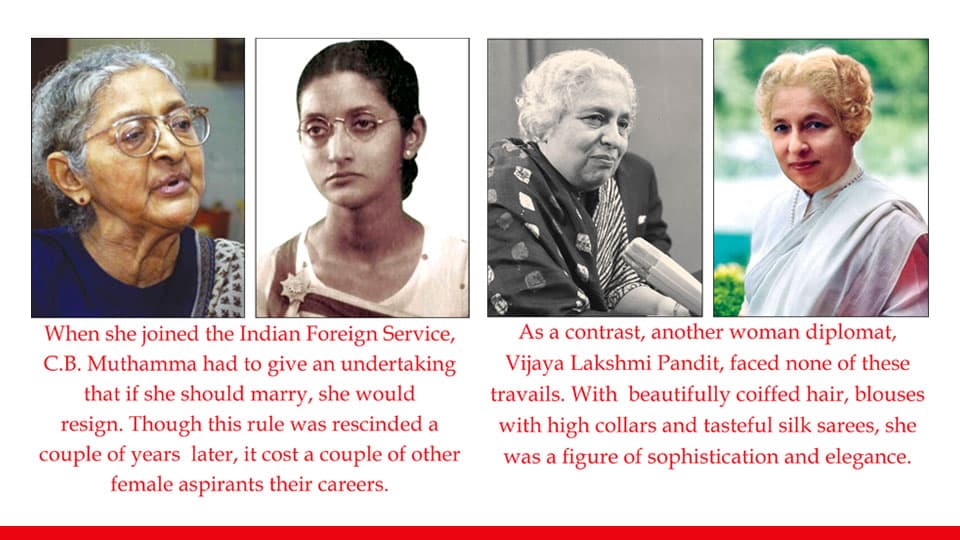
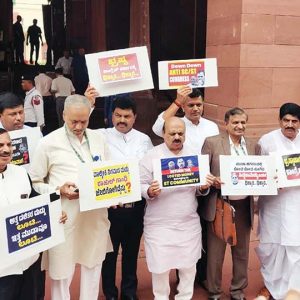
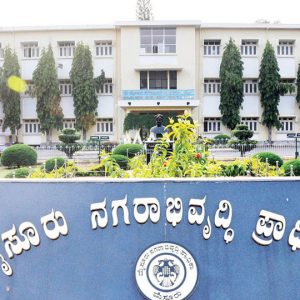
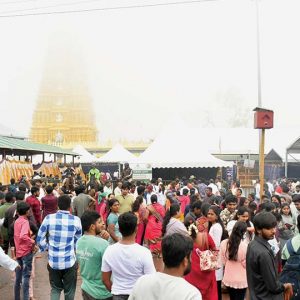
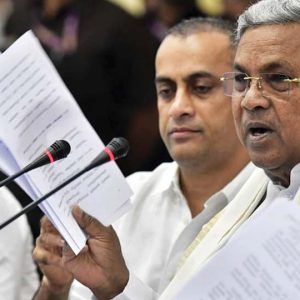
There is nothing like high commissioner to London. You cannot appoint an ambassador-that is what the high commissioner is when referring to commonwealth country diplomacy, to a city, but only to a country. In this case: Britain. Mrs Pandit was a superb high commissioner, most of which is well known and is on record.
You need to check the facts, and practices in the foreign service, and I am puzzled, you seem to be ignorant of them!
Again, a nostalgic piece to focus on own, an attention-seeking aspect, as it always linked to this woman and her husband.
I have been reading this @Ms Girija Madhavan’s stories-about her growing up days in Raliway officers’ quarters in Yadavagiri her days in Boon, Germany, Tokyo in Japan, getting toys from Devaraja market shops, etc. ., along with these nuggets of episodes unverifiable ofcourse. I have wondered whether these have been her imaginary tales mixing myths with reality, as unless she has recorded all these in a diary right from her younger days as a school-going girl or has an extraordinary memory of storing seven small details in her life,I should conclude that most of them have been the product of her rich imagination-the myth. The reality ofcourse were the photographs, just them for authenticity!
Now, about this High Commissioner anecdote. Well Ms Madhavan’s words, and no more! But, as a diplomat’s wife, she does not even know that while High Commission of In dia has been located in London, the capital, as all embassies in all countries are, it is a diplomatic representation of India to the UK, rather than to London. Interesting that it escaped the editor’s scrutiny!
Those who worked with Mrs Vijayalashmi Pandit, were impressed with her politeness , and it is very unlike Mrs Pandit to have uttered those words in regards to that diplomate’s wife. It was not plausible for a young diplomate’s wife to do just as she did, knowing fully well, how the offical hierarchy in India works, which is practiced in its diplomatic representations across the world.
There have been plenty of articles about Mrs Vijalakshmi Pandit, there was a text book chapter, a long chapter, when I was studying in my high school in Mysore. She was lucky to be born as the sibling of Jawaharlal Nehru, which meant the influence of Mahatma Gandhi, just enough to become the ambassador of countries like the UK, USSR, USA as well as her governorship of Maharashtra and her position in the UN General Assembly-all even recorded in Wikipedia.
I agree with the above posters.
It is amusing to notice that the 2 columnists: Javeed Nayeem and Girija Madhavan, always start with narratives which often are historical, and manage to insert themselves in their midst, drawing attention to themselves! There has been nothing like an observer status for these 2 columnists, which would make their narratives more authentic and plausible.
For these 2 columnists, I recommend the read of ‘Biographical Vistas’ an excellent book ( may be out of print now), by Sir C P Ramaswamy Iyer, who held so many important positions in the pre and post-independent India. In all the chapters -he calls them vistas, he narrates his experiences in political and diplomatic areas, at a high level, making himself an observer, although, he had been involved in all of them!
Mr Iyer was an excellent lawyer, with a forceful argumentative personality, which Nehru knew well, and yet he did not pick him to argue the case of J amd Kat the Un , at the time of the cease fire between India and Pakistan, when the matter was referred to the UN. Nehru, bungled and instead sent the useless Gopalaswamy Ayyangar, his cabinet colleague, who bungled the Indian case, and was no match for the excellent lawyer that Pakistan sent.